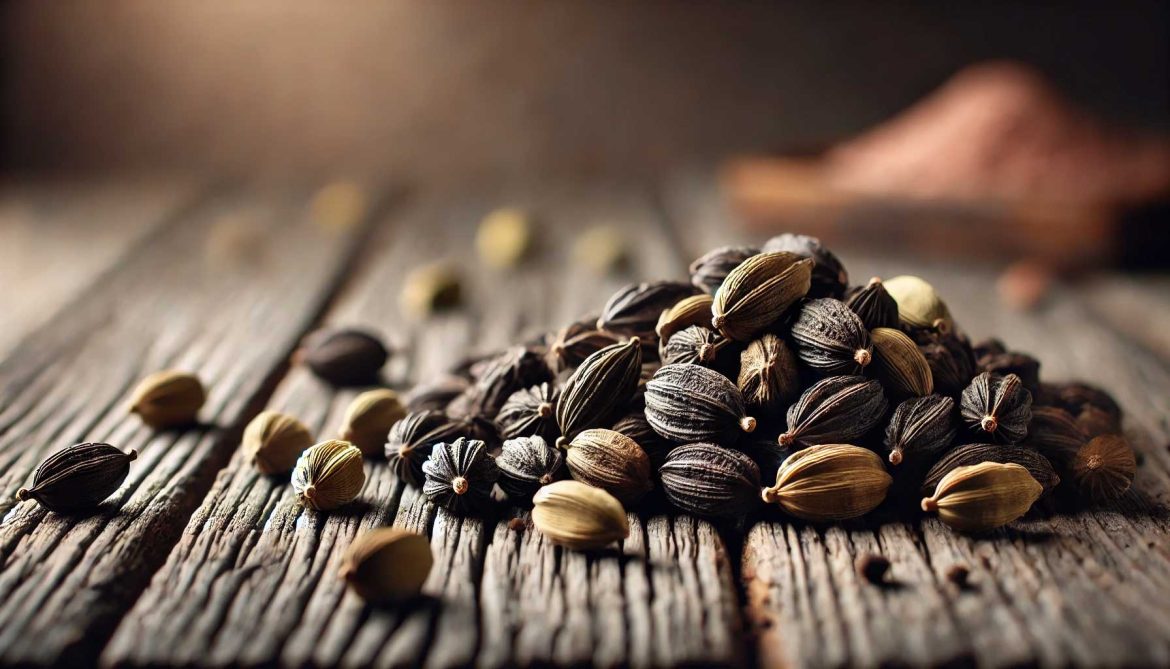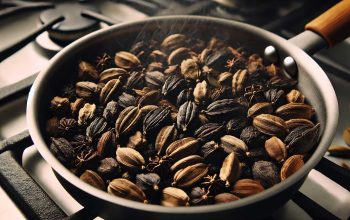Black cardamom is a unique spice that bridges culinary artistry with traditional health remedies. With its bold smoky flavor and multiple benefits, it plays a pivotal role in global cuisines and wellness practices.
The Science Behind Black Cardamom’s Unique Flavor
Black cardamom’s distinctive aroma results from its chemical composition and unique processing methods.
Key Compounds:
- Cineole: Provides a cooling effect, often found in eucalyptus.
- Terpineol: Adds woody, slightly floral undertones.
- Sabinene: Enhances its peppery notes.
The smoky flavor is due to the open-flame drying process, a technique passed down through generations. This flavor complexity is why it’s favored in slow-cooked dishes, where its depth can fully develop.
Exploring Culinary Techniques
Grinding for Maximum Flavor
When using ground black cardamom, prepare small batches to ensure freshness. A mortar and pestle work best to retain its oils.
Infusing Liquids
Simmering black cardamom pods in broths or milk releases their flavor slowly, making them ideal for beverages and soups.
Black Cardamom in Global Cuisine
- Africa: In Ethiopian cuisine, it’s a component of berbere, a bold spice mix.
- Southeast Asia: Black cardamom flavors Vietnamese pho, enhancing its deep, umami-rich broth.
- Middle East: Used in kabsa, a traditional rice dish, for its smoky complexity.
Integrating Black Cardamom into Everyday Life
Quick Breakfast Idea
Add ground black cardamom to oatmeal with honey for a warming start to your day.
Innovative Snack:
Create spiced popcorn by mixing melted butter with crushed black cardamom, cinnamon, and a pinch of salt.
Drinks Beyond Tea
Try infusing black cardamom in cocktails like smoky old-fashioned or in winter punches.
Cultural Insights
Black cardamom has been revered for its symbolic significance in various traditions:
- In Ayurveda: It is used in rituals to signify purification and balance.
- Tibetan Offerings: Often included in traditional ceremonial teas.
- African Traditions: Considered a spice of strength and protection.
“Its cross-cultural appeal lies in its adaptability to both flavor and symbolism.”
Expanded Health Benefits
- Metabolic Boost: Black cardamom may assist in regulating metabolism, contributing to better weight management.
- Immune System Support: The antimicrobial properties of black cardamom help in fighting infections, especially during colder months.
- Hormonal Balance: Traditional medicine attributes its warming properties to better hormonal regulation.

Frequently Asked Questions
- What’s the best substitute for black cardamom? Smoked paprika or a combination of green cardamom and cloves can mimic its smoky and spicy profile.
- Can I use black cardamom in desserts? Yes! Its boldness pairs well with dark chocolate or warm spices in cakes and puddings.
- How should I store black cardamom? Keep it in an airtight container, away from sunlight, to maintain its flavor and aroma.
- Is black cardamom healthy for daily use? In moderate amounts, it offers health benefits, but excessive use may cause digestive discomfort.
- How does black cardamom differ from green cardamom? Green cardamom is sweet and floral, ideal for desserts. Black cardamom is smoky and robust, suited for savory dishes.
- Can I reuse black cardamom pods? Yes, pods used in tea or broths can be dried and reused for a milder flavor.
- What are its main culinary pairings? It pairs well with cumin, cloves, cinnamon, and bay leaves for savory recipes.
- Is black cardamom eco-friendly? As a naturally harvested spice, it generally has a smaller ecological footprint, provided it’s sourced sustainably.
- Why is black cardamom smoked? Smoking is a traditional preservation method that enhances its flavor.
- Can black cardamom help with cold symptoms? Yes, its warming properties and essential oils are effective in easing colds and congestion.



